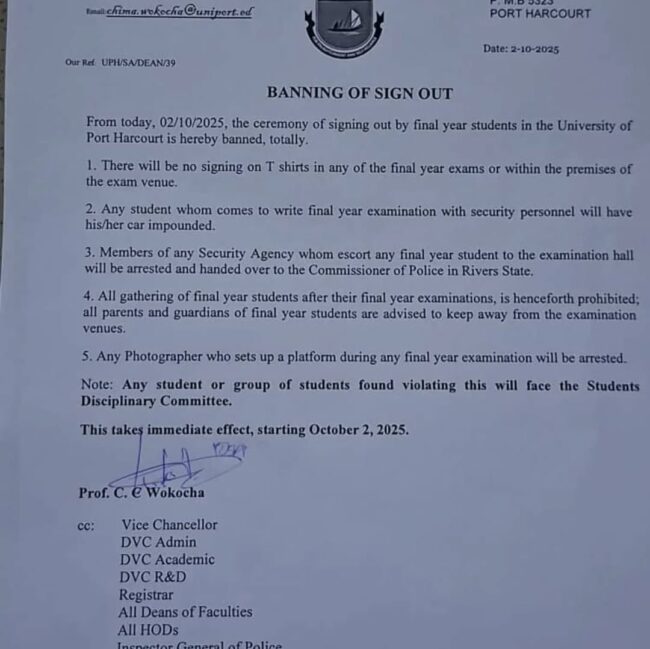
UNIPORT Bans Final-Year “Sign Out” Celebrations Over Security Concerns
University cites discipline and safety as reasons for clampdown
Port Harcourt, Nigeria – October 3, 2025
The University of Port Harcourt (UNIPORT) has banned the widely celebrated “sign out” ritual for final-year students, citing security concerns and the need to maintain order during examinations. The directive, signed by the Dean of Student Affairs, Prof. C. E. Wokocha, took immediate effect on October 2, 2025.
The “sign out” tradition, which has become a hallmark of Nigerian university life, involves graduating students wearing white shirts signed by classmates, friends, and well-wishers to mark the end of their academic journey. In recent years, the ritual has expanded beyond T-shirt inscriptions to include large gatherings, parties, and social events, sometimes spilling outside the campus gates.
In its memo, the university prohibited students from signing or wearing signed T-shirts in examination halls or within the premises of exam venues.
The directive also warned that any student arriving with security escorts to examinations would have their cars impounded, while the security personnel themselves would be arrested and handed over to the Commissioner of Police in Rivers State.
Furthermore, gatherings of final-year students after examinations have been banned, with parents and guardians advised to stay away from examination venues.
Photographers attempting to set up platforms for students during final-year examinations would also face arrest.
The memo emphasized that any student or group of students who defied the ban would be referred to the Students Disciplinary Committee, highlighting the university’s determination to enforce the directive strictly.
While the memo did not explicitly state the reasons beyond maintaining security and order, the decision comes against the backdrop of growing unease over the excesses of sign-out celebrations across Nigerian campuses. In many instances, the festivities have escalated into rowdy behavior, traffic disruptions, and even security breaches.
Reports in Port Harcourt recently pointed to cult-related threats linked to student gatherings, with some individuals arrested for allegedly planning to exploit sign-out ceremonies. Such incidents may have influenced UNIPORT’s decision to clamp down on the practice entirely.
The University of Port Harcourt is not alone in this move. Earlier in the year, Nnamdi Azikiwe University (UNIZIK) in Awka also imposed a ban on the sign-out ritual, warning students against wearing signed shirts or holding processions within campus premises.

Other institutions, including polytechnics and colleges of education, have begun reassessing the tradition, citing both safety and moral concerns. Educationists have described the practice as a “slippery slope,” noting that what began as a simple mark of achievement has evolved into elaborate celebrations that, in some cases, create avenues for cultists and outsiders to infiltrate university spaces.
Reactions among students have been divided. Some accept the ban as a necessary step to safeguard order, particularly in light of Nigeria’s growing security challenges. Others, however, view the decision as a denial of a cherished rite of passage. For many, the act of wearing signed shirts is more than a display of joy; it symbolizes endurance and the successful completion of a demanding academic journey. “This is more than just writing on shirts. It is a tradition that represents our joy, our survival, and our journey,” one final-year student lamented on social media, calling on the university to seek alternatives rather than impose a blanket prohibition.
With the ban now in effect, the University of Port Harcourt has joined the growing list of Nigerian institutions changing this student culture in response to security concerns and institutional priorities. Whether the policy will be strictly enforced remains to be seen, but the message from the university is clear: discipline and safety will take precedence over traditions. For graduating students, the challenge now is to find new, acceptable ways to celebrate the conclusion of their academic journey.